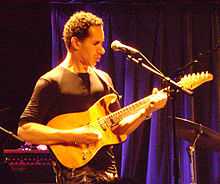David Gilmore
| David Gilmore | |
|---|---|
 Gilmore, playing with Cindy Blackman, in Treibhaus, Innsbruck 2011 | |
| Background information | |
| Born |
5 February 1964 Cambridge, Massachusetts United States |
| Genres | Jazz, jazz fusion |
| Occupations | Musician, songwriter, producer |
| Instruments | Guitar |
| Years active | 1987–present |
| Associated acts | Ronald Shannon Jackson, Wayne Shorter, Five Elements |
| Website | www.davidgilmore.net |
David Gilmore (born 5 February 1964 in Cambridge, Massachusetts) is an American session jazz guitarist.[1]
Gilmore studied at New York University with Joe Lovano and Jim McNeely. In 1987 he began working professionally with the "M-Base Collective" and Ronald Shannon Jackson. In the 1990s he was a member of a jazz fusion band called Lost Tribe[2] and has also appeared with Me'shell N'Degeocello, Monday Michiru and Tom Lang. He appeared on records by Steve Coleman, Cassandra Wilson, Michael Kamen, Steve Williamson, Elton John, M-Base Collective, Strata Institute, Lonnie Plaxico, Don Byron as well as Sun Ra & His Intergalactic Arkestra.
In 1995, he became a member of Wayne Shorter's band. Together with his brother Marque Gilmore, Matt Garrison and Aref Durvesh, he founded Kindred Spirits' CD Ritualism in 2001. Together with Christian McBride, Jeff "Tain" Watts and Ravi Coltrane he recorded Unified Presence. Recorded in 2004–2005, the album received critical acclaim upon its release in 2006. Gilmore was the sole composer on all but one song, and also served as the producer of the album.[2]
Gilmore has also worked as a session musician alongside Trilok Gurtu, Don Byron, Cassandra Wilson, Steve Coleman,[3] Cindy Blackman, Geri Allen, Alice Coltrane, Tom Arnold, Carolyn Leonhart, Randy Brecker, trumpeter Dave Douglas, George Duke, Sam Rivers, Lenny White, Uri Caine, and Zap Mama. He also played guitar on Joss Stone's Mind Body & Soul Sessions: Live in New York City.
Discography
- Ritualism (2000)
- Unified Presence RKM Music (2006)
- Numerology: Live at Jazz Standard (2012)
References
- ↑ Chinen, Nate (14 January 2010). "Celebrating the Tension Between Art and Science". The New York Times. Retrieved 27 March 2010.
- ↑ 2.0 2.1 Tamarkin, Jeff. "Unified Presence: Review". Allmusic. Retrieved 1 January 2012.
- ↑ Andrews, Scott (19 November 2002). "David Gilmore: Ritualism (2000)". All About Jazz. Retrieved 1 January 2012.